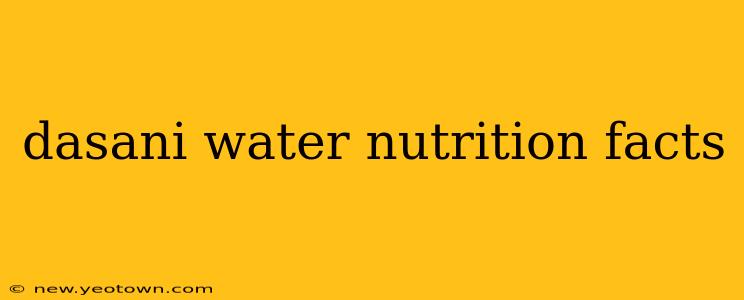Dasani, Coca-Cola's purified water brand, has become a ubiquitous presence in homes and offices across the globe. But beyond its refreshing taste, what exactly is Dasani water? This in-depth look at Dasani water nutrition facts will unpack its composition, address common questions, and delve into its place in the broader bottled water market.
Let's embark on this journey together, starting with the basics:
Dasani Water Nutrition Facts: The Basics
The beauty of Dasani, and purified water in general, lies in its simplicity. A serving of Dasani contains essentially zero calories, zero fat, zero carbohydrates, zero protein, and zero sugars. It's just water – H2O – after undergoing a purification process. This makes it a popular choice for those watching their calorie intake or seeking a simple, hydrating beverage.
What is the process of purifying Dasani water?
Dasani's purification process is a key element setting it apart. While the exact proprietary details aren't publicly available, Coca-Cola states that Dasani undergoes a multi-step purification process that typically involves several key stages:
-
Source Water Selection: The process begins with selecting a source water supply that meets rigorous quality standards.
-
Filtration: Multiple filtration methods are used to remove impurities like sediment, chlorine, and other potential contaminants. This can involve processes like reverse osmosis, carbon filtration, and microfiltration.
-
Mineral Adjustment (Often a Point of Discussion): This is where some debate arises. While the exact mineral additions vary slightly by region and plant, Dasani's purification process may involve adding minerals like potassium and magnesium to enhance taste and improve the overall quality of the water. It aims to create a balanced, refreshing taste.
Does Dasani water contain minerals?
Yes, and this is a frequent source of questions and often misunderstood. While starting as purified water (essentially devoid of minerals), Dasani typically adds small amounts of minerals back in during the purification process. This is done to improve the taste and potentially mimic the mineral profile of naturally occurring spring water, which many find more appealing than completely pure water. These minerals are generally found in trace amounts and vary slightly by region and production facility. The exact mineral content can be obtained from the product label of each individual bottle.
What minerals are in Dasani water?
The specific minerals in Dasani water aren't consistently listed on every label and can vary slightly by region and manufacturing batch. However, you can generally find Potassium and Magnesium as added minerals. For precise details, refer to the label on the specific bottle you have.
Is Dasani water good for you?
Dasani, being purified water, is generally considered a healthy hydration option. It’s calorie-free and devoid of additives beyond the minerals mentioned earlier. However, the environmental impact of bottled water should be considered. Many advocate for reusable water bottles as a more sustainable alternative. Ultimately, whether Dasani is "good" for you depends on your individual needs and health goals, and always consult with a healthcare professional for specific dietary guidance.
Is Dasani water better than tap water?
This is a matter of personal preference and often depends on the quality of your local tap water. Dasani undergoes a rigorous purification process, removing impurities that might be present in tap water. However, tap water is often more affordable and environmentally friendly. The "better" option depends on individual priorities, including taste, cost, and environmental concerns.
Conclusion
Dasani water offers a convenient and readily available hydration option. Its simplicity and the absence of calories, fat, carbs, and sugar make it a popular choice. However, understanding the purification process and potential mineral additions is crucial to making informed choices about your hydration. Ultimately, the best choice for hydration comes down to your own preferences and the quality of your local tap water. Remember to always check the specific label for the precise mineral content on the bottle you're consuming.

